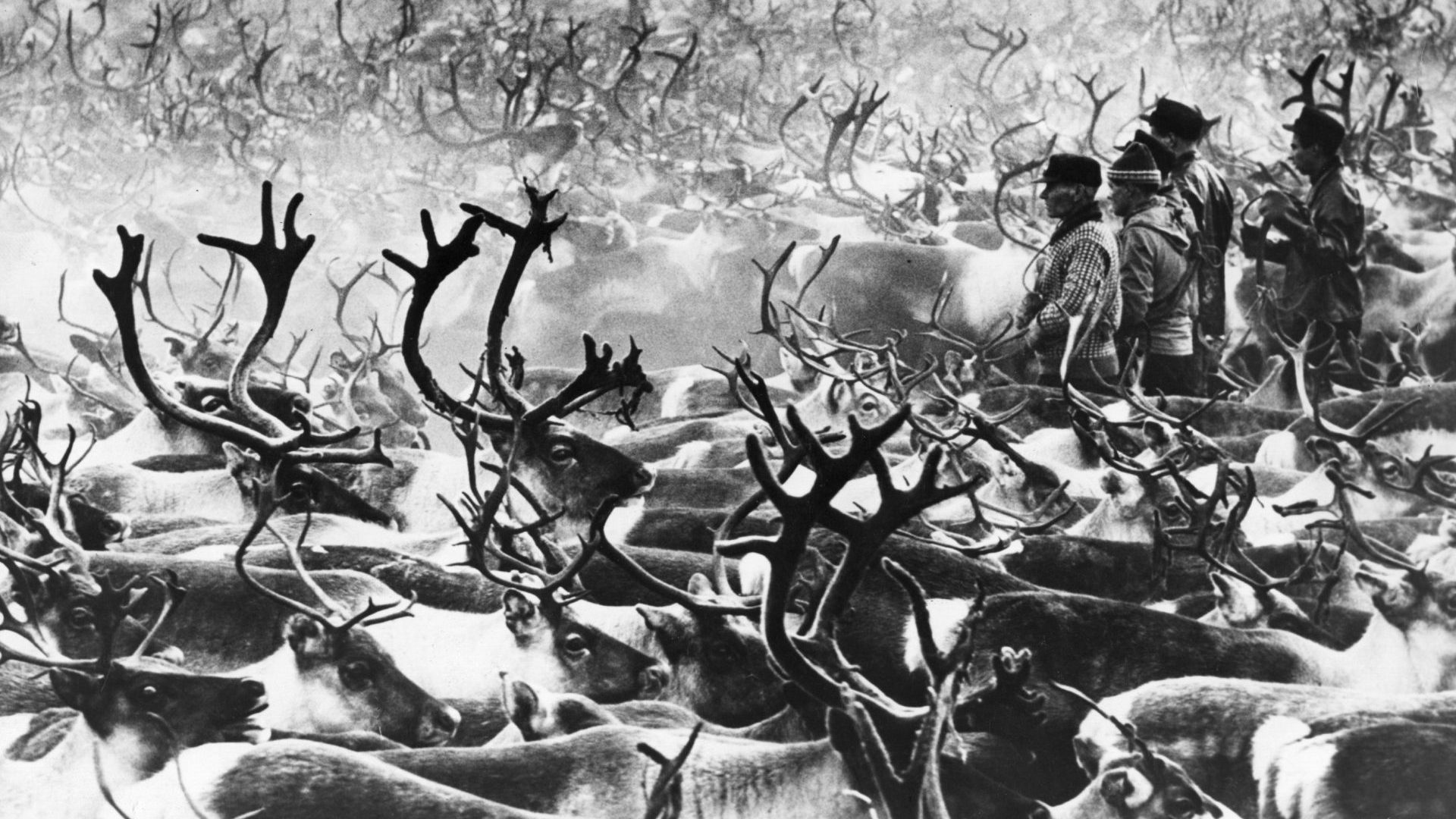Can you name the only indigenous people recognised as such by the European Union? No? It’s not the most exciting trivia question you’ll ever
be asked, granted, but in case it ever comes up I can tell you – it’s the Sámi.
The Sámi homeland of Sápmi, which covers a swathe of land across Norway,
Sweden, Finland and Russia, most of it above the Arctic Circle, is home to a
people with a distinct culture and language numbering approximately 70,000 across the region. While the demands of the modern world have seen most Sámi become settled over the past couple of centuries, a minority still engage in the traditional pursuit of reindeer herding, wintering the animals in the lowlands of Sápmi before migrating to the region’s western mountains. The Sámi have been reindeer herders since the end of the last Ice Age, two species coexisting perfectly in their itinerance, establishing yearly rhythms and routines unchanged in thousands of years.
Geopolitical shifts have brought others to the region over the centuries, meaning the Sámi have faced a persistent cultural and political battle to preserve their way of life, from the forced conversion attempts of aggressive Christianity and the imposition of land borders in Sápmi between Scandinavian countries to, most recently, reindeer-herding grounds being requisitioned for mining and forestry exploitation.
Over the last century, an estimated 70% of natural reindeer habitat has been lost to non-Sámi commercial activity, with Greta Thunberg’s foundation last year donating £158,000 to help fight a proposed iron-ore mine operated by a British company on reindeer territory, a project the Sámi have been fighting for over a decade.
“By doing so they have been safeguarding what keeps us all safe: biodiverse forests, intact carbon stock as well as clean water and air,” said Thunberg.
In addition, the Sámi are having to cope with the effects on their homeland and culture of climate change, a process much more visible at the top of the globe. Temperatures in Sápmi have surged well into the 30s during recent summers and by 2040 the average temperature in the region will have risen by two degrees since the turn of the millennium.
Assailed by challenges from all directions from the effects of a changing climate to everyday racism the Sámi are campaigning hard to assert their rights and culture, facing an uncertain future and struggling from their Arctic location to make themselves heard beyond their own region. The international reputations of Norway, Sweden and Finland as enlightened, progressive societies also mean that when it comes to inequality and prejudice the rest of the world is already looking the other way.
If anything might change that, it’s a new novel by Ann-Helén Laestadius that manages to distil the contemporary Sámi experience into a gripping and moving work of literary fiction.
Laestadius is one of Sweden’s leading authors of fiction for young adults but Stolen, her first work aimed primarily at adults, was voted the Swedish Book of the Year in 2021 and promises to have a substantial international impact. With translation rights sold into 22 territories and a Netflix adaptation coming next year, Stolen promises to be the catalyst for a greater global awareness of the range of issues facing the Sámi. First and foremost, it’s a terrific novel.
Born to a Sámi mother and a Tornedalian father – a minority drawn from descendants of ethnic Finns who migrated to Sweden at least 2,000 years ago – Laestadius grew up in northern Sweden listening to her mother speaking in the Sámi language to family and friends but otherwise speaking Swedish. She moved to Stockholm to pursue a career as a journalist, a distance that allowed a sober assessment of why her mother – and by extension herself – might have felt an unspoken shame about her language and heritage. Looking north from the capital, Laestadius was able to calibrate her own feelings about her heritage and bring into sharp relief the plight of the Sámi.
The persistent degradation of Sámi rights and culture has, like most prejudices, consisted of sweeping concerted action over many years and incremental sniping that in isolation seems minor but is incontrovertibly part of a wider campaign of repression. There have been moves in the right direction. The Swedish Lutheran church has apologised for its historic attempts to obliterate Sámi religious beliefs and indoctrinate generations of Sámi children forced into its boarding schools, while last year the Swedish government finally agreed to return the remains of 18 Sámi used as research subjects for racially prejudiced research in the early 20th century.
Yet Sweden is still to ratify the 1989 Indigenous and Tribal Peoples Convention, a binding global agreement guaranteeing the rights of indigenous people, and took until the current millennium even to recognise the Sámi language. Two years ago the UN Committee on the Elimination of
Racial Discrimination ruled that Swedish law discriminates against the Sámi, noting, in particular, the lack of consultation over mining permits issued on Sámi land.
While incorporating all these issues, Stolen, based on real events, focuses on one particularly cruel aspect of the injustices acted out against the Sámi.
Their language is believed to have more than 1,000 words specifically relating to reindeer. If anything can be said to represent the Sámi people it’s
their relationship with the animals they have spent thousands of years living alongside in some of the harshest conditions on the planet.
Reindeer have provided the Sámi with food as well as skins from which to make clothes, while antlers and bones have been repurposed as tools and even weapons. Theirs is among the planet’s most enduring and intimate relationships between human and animal, one that forms the bedrock of Sámi life and culture.
The changes in the landscape forced on the Sámi by deforestation, mining and at least one hydroelectric project have had a wide impact on reindeer migration routes and feeding grounds, but it’s physical attacks on reindeer,
mutilations and killing, that really strike at the heart of the Sámi. In 2020
the Swedish supreme court granted, after a long and turbulent campaign,
exclusive hunting and fishing rights to an area of northern Sweden close to
the border with Norway. Almost immediately reindeer began turning up dead, either slashed or shot, most likely by Swedes aggrieved at their exclusion from the hunting grounds. That case made the news, but it’s been going on for years.
Stolen opens with one such attack. In 2008, nine-year-old Elsa skis alone to
her community reindeer corral one dark evening to feed the animals and
stumbles across a man from their village killing one of the reindeer. When he spots her he grins, puts his finger to his lips, makes a throat-cutting gesture at Elsa and departs. On closer examination, she realises that the animal the man has just killed is Nástegallu, the reindeer assigned to her at birth.
It’s a trauma that, through fear of a man known in the community as much for being a bigot as a poacher, Elsa has to keep to herself for most of this extraordinary novel.
The reindeer killings continue and, to a mixture of resignation and
frustration, the police fail to even investigate, classifying the incidents –
more than 100 of them – as low-level thefts while claiming stretched resources prevent them from doing more. Even when a grown-up Elsa
finds the gruesome remains of two reindeer stripped for their meat, takes
them and dumps them on the doorstep of the police station, not only does
nothing happen but this shockingly visceral evidence of a serious crime is
later found arranged almost ceremonially at a location frequented by Sámi in a grotesque provocation.
Stolen is excellent at documenting the casual, everyday prejudice endured by the Sámi, the half-heard whispered comments, the nimby complaints about untidy gardens, victim blaming, the sharp glances noticed when speaking the Sámi language: “The only good Lapp is a dead Lapp” posted on Elsa’s father’s Facebook page (“Lapp” is classed as a derogatory term by the Sámi),
planning objections to remote reindeer herders’ huts miles from the nearest
settlements, even the tourists asking Sámi people to pose for photographs in their traditional gátki clothing at the annual market and festival.
Beneath the examples of overt discrimination runs this constant belittling thrum of othering, the kind of relentless marginalisation that prompts Elsa to describe how “being Sámi meant carrying your history with you, to stand before that heavy burden as a child and choose to bear it or not”.
Some novels inspired by a cause or campaign can feel hectoring, their plot and characterisation suffering by being secondary to an overarching point that’s constantly jabbing the reader in the chest. There’s never any danger of that here. Elsa is a wonderfully drawn and nuanced protagonist leading us through a story that grips while weaving in aspects of the Sámi struggle, from playground bullying to suicide, with a perfectly-pitched lightness of touch.
Bigots are bigots whatever the target of their prejudice and Stolen will resonate with a range of marginalised people subjected to the sneering fear of those intimidated by difference (towards the end of Stolen, Polish people emerge as another form of bogeyman), but this is an important book for its concise amplification of the particular challenges facing a particular people
inhabiting the northernmost part of our continent. It’s also an extraordinarily good novel.
Stolen by Ann-Helén Laestadius, translated by Rachel Willson-Broyles, is published by Bloomsbury Circus, price £18.99




